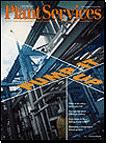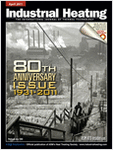Display problem ? Click HERE
Recommended :
Subscribe FREE - Plant Services
 Liquid is known as "incompressible" fluid. When it is trapped or blocked with heat input, liquid expansion with with insufficient room for expansion or release, the internal pressure exerted on liquid container i.e. pipe, vessel, etc would increases quickly. This is known as hydraulic expansion thermal relief which potentially leads to piping or equipment fail catastrophically.
Liquid is known as "incompressible" fluid. When it is trapped or blocked with heat input, liquid expansion with with insufficient room for expansion or release, the internal pressure exerted on liquid container i.e. pipe, vessel, etc would increases quickly. This is known as hydraulic expansion thermal relief which potentially leads to piping or equipment fail catastrophically.
Subscribe FREE - Plant Services
 Liquid is known as "incompressible" fluid. When it is trapped or blocked with heat input, liquid expansion with with insufficient room for expansion or release, the internal pressure exerted on liquid container i.e. pipe, vessel, etc would increases quickly. This is known as hydraulic expansion thermal relief which potentially leads to piping or equipment fail catastrophically.
Liquid is known as "incompressible" fluid. When it is trapped or blocked with heat input, liquid expansion with with insufficient room for expansion or release, the internal pressure exerted on liquid container i.e. pipe, vessel, etc would increases quickly. This is known as hydraulic expansion thermal relief which potentially leads to piping or equipment fail catastrophically.Vessel or other pressure contained compartment to industrial accepted code such as ASME, JIS, DIN, GB, etc. These codes would request pressure relief device i.e. pressure relief valve (PRV) to protect the vessel or pressure contained compartment from overpressure scenario including hydraulic expansion thermal relief. Nevertheless, the piping design code i.e. ASME does not request pressure relief device and it subject to analysis and justification.
There are several aspects shall be considered to analyze and judge if thermal relief is required :- Heat source & heat input rate
- Liquid properties
- Trapped volume & pressure level
- System tightness & leakage
- Blocking-in probability and safe procedure
- other means of thermal relief
There are several potential heat sources :
- Hot fluid or heating medium in heat exchanger or heater
- Heating fluid in Jacketed / Coiled Vessel
- Reactor (exothermic reaction ) with cooling medium in jacket
- External fire
- Heat tracing by heating medium or electricity
- Ambient heat input (due to hot environment i.e. coal boiler house)
- Solar radiation
Item (5) has lower potential in high heat input as compare to item (1) to (4). High availability and reliability safeguarding device shall be provided in order to eliminate the potential of liquid expansion and thermal relief. In many event, providing a small DN15x20 PSV is much cost effective than providing other safeguarding measures.
Item (6) and (7) have least potential in high heat input. If the system can be buried, shielded, painted with white or metallic paint to reflect solar radiation, or efficiently insulated to minimise heat gain, the requirement for thermal relief can probably be eliminated. Again, in many event, providing a small DN15x20 PSV is much cost effective than providing other safeguarding measures.
Trapped Liquid Properties
 Those liquid trapped or blocked in is flammable, low boiling point including cryogenic type, volatile and toxic are regarded high potential liquid expansion and high risk liquid group. Thermal relief is always required however subject to trapped volume quantity, likelihood of liquid trapped event, risk to human, etc. Low risk liquid such as water, solar radiation heat input is very unlikely to create a safety hazard. Nevertheless, for long pipeline with large volume liquid, there is still a potential liquid expansion lead pipeline failure.
Those liquid trapped or blocked in is flammable, low boiling point including cryogenic type, volatile and toxic are regarded high potential liquid expansion and high risk liquid group. Thermal relief is always required however subject to trapped volume quantity, likelihood of liquid trapped event, risk to human, etc. Low risk liquid such as water, solar radiation heat input is very unlikely to create a safety hazard. Nevertheless, for long pipeline with large volume liquid, there is still a potential liquid expansion lead pipeline failure.
Trapped volume & Pressure Level
Trapped volume and pressure level links to risk and hazard level. Large the trapped volume and higher the pressure level, the higher the risk and hazard level to human and surrounding and a thermal relief protection is required.
Blocking-in probability and safe procedure
A system normally in flowing condition and will only be blocked in during maintenance period, a safe administrative procedure is implemented to ensure no trapped liquid during blocked in condition, it can be acceptable not to consider liquid expansion lead to catastrophe failure. This is inline with API Std 521, 2007. Nevertheless, special cases such as long pipeline and large vessel & exchanger and safety analysis shows the probability is reasonably high, a detail calculation and analysis is required to justify requirement of PSV for thermal relief.
System tightness & leakage
A small leakage across valve, flanges and fittings would significant reduce the likelihood of overpressure due to liquid expansion. However, the leakage via these device may be guaranteed the leakage rate and failed to justify in quite a lot of similar event.
Other means of thermal relief
Present of other means of relief such a control valve, high reliability device, etc would reduce the likelihood of liquid expansion.
Following is flow chart can be used to helps any engineer to determine if a thermal relief PSV is required.
Above flow chart is a tool to assist engineer to make a quick check if a thermal relief PSV is required. However, it does not cover risk level for all scenario. Using this flowchart with a sound engineering judgment and analysis shall be implemented simultaneously.
Related Post
Item (6) and (7) have least potential in high heat input. If the system can be buried, shielded, painted with white or metallic paint to reflect solar radiation, or efficiently insulated to minimise heat gain, the requirement for thermal relief can probably be eliminated. Again, in many event, providing a small DN15x20 PSV is much cost effective than providing other safeguarding measures.
Trapped Liquid Properties
 Those liquid trapped or blocked in is flammable, low boiling point including cryogenic type, volatile and toxic are regarded high potential liquid expansion and high risk liquid group. Thermal relief is always required however subject to trapped volume quantity, likelihood of liquid trapped event, risk to human, etc. Low risk liquid such as water, solar radiation heat input is very unlikely to create a safety hazard. Nevertheless, for long pipeline with large volume liquid, there is still a potential liquid expansion lead pipeline failure.
Those liquid trapped or blocked in is flammable, low boiling point including cryogenic type, volatile and toxic are regarded high potential liquid expansion and high risk liquid group. Thermal relief is always required however subject to trapped volume quantity, likelihood of liquid trapped event, risk to human, etc. Low risk liquid such as water, solar radiation heat input is very unlikely to create a safety hazard. Nevertheless, for long pipeline with large volume liquid, there is still a potential liquid expansion lead pipeline failure.Trapped volume & Pressure Level
Trapped volume and pressure level links to risk and hazard level. Large the trapped volume and higher the pressure level, the higher the risk and hazard level to human and surrounding and a thermal relief protection is required.
Blocking-in probability and safe procedure
A system normally in flowing condition and will only be blocked in during maintenance period, a safe administrative procedure is implemented to ensure no trapped liquid during blocked in condition, it can be acceptable not to consider liquid expansion lead to catastrophe failure. This is inline with API Std 521, 2007. Nevertheless, special cases such as long pipeline and large vessel & exchanger and safety analysis shows the probability is reasonably high, a detail calculation and analysis is required to justify requirement of PSV for thermal relief.
System tightness & leakage
A small leakage across valve, flanges and fittings would significant reduce the likelihood of overpressure due to liquid expansion. However, the leakage via these device may be guaranteed the leakage rate and failed to justify in quite a lot of similar event.
Other means of thermal relief
Present of other means of relief such a control valve, high reliability device, etc would reduce the likelihood of liquid expansion.
Following is flow chart can be used to helps any engineer to determine if a thermal relief PSV is required.
Above flow chart is a tool to assist engineer to make a quick check if a thermal relief PSV is required. However, it does not cover risk level for all scenario. Using this flowchart with a sound engineering judgment and analysis shall be implemented simultaneously.
Related Post
- Why Rupture (RD) Upstream of Pressure Relief Valve (PRV) ?
- Why Two Rupture Discs in Series ?
- Tube Rupture : Pressure Relief Valve (PSV) or Rupture Disk (RD) ?
- Criteria for Requirement of Pressure Relief Device for Tube Rupture
- Some Comments on Providing External Insulation as Protective Measure against FIRE
- Protective Measures against FIRE other than Pressure Relief Device (PRD)
- Design Temperature (Td) versus Maximum Allowable Working Temperature (MAWT)
- PSV for Shell-and-Tube HEX Tube Side Overpressure Protection against External Fire Attack ?
No comments:
Post a Comment